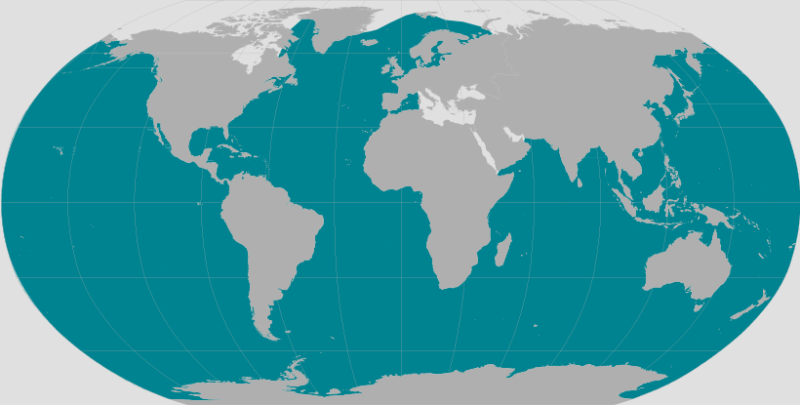Blue Whale
The Blue Whale Balaenoptera musculus
Blue Whale Description and Fun Facts
- Blue whale is the largest animal in the world. They can weigh up to 200 tons.
- Blue whales can get up to 100 feet long.
- Blue whales eat up to 8,000 pounds of krill per day!
- Blue whales are the loudest animals on earth with calls up to 188 decibels, and can be heard from 100s of miles away.
- Blue whales live 80-90 years on average.
- Blue whales can swim at speeds of up to 50 miles per hour!
- Blue whales are mammals and breath air.
- Blue whales have a heart that weighs 400 pounds and beats at around 2 beats per minute.
- There are thought to be 10,000-25,000 individuals left in the wild.


Habitat and Range
- Blue whales inhabit almost all of the worlds oceans.
- They are migratory with summer feeding grounds and winter breeding grounds.
- They go wherever there are concentrated krill to eat.
Blue whale range

Ecosystem Niche
- Blue whales feed primarily on krill consuming 10s of thousands per day.
- They play an important role in maintaining the stability of the ecosystem.
- They are only hunted by killer whales.
- They are almost at the top of the food chain.
Cause of Decline
- The primary cause of the decline of the blue whale was extremely heavy whaling in the 19th and early 20th centuries.
- An estimated 350,000 blue whales were killed in whaling in about the life span of 1 blue whale. Remember 10,000-25,000 blue whales are thought to be alive today.
- The life cycle of the blue whale is not super well know but it is though that gestation takes 10-12 months, weaning takes 6-7 months, sexual maturity is reached between 5 and 15 years, birthing cycle is every 2-3 years.
- Because of the incredibly slow birth rate species rebound is very slow even though the blue whale became internationally protected by 1966.
- The threats today are not as extreme as whaling.
- Ship strikes can kill or severely injure whales.
- They can be killed by becoming entangled in fishing equipment.
What if Blue Whales go Extinct?
- Without blue whales eating 10s of thousands of krill per day, their population would explode and deplete the bottom level of the ecosystem (algae and phytoplankton).
- This takes the food supply from other species in the ocean.
- This would cause a catastrophic imbalance in the marine ecosystem.
Conservation Efforts
- NOAA has extensive conservation work in place.
- They do everything from coordinating international laws and regulation to prevent whaling to recovering beached whales.
- Very little in know for sure about the biology and behavior of the blue whale so much of NOAA's work is centering around researching blue whales to better understand how to protect them.
- Blue whales are protected under the Endangered Species Act and the Marine Mammal Protection Act.
Geography in the Conservation of Blue Whales
- As mentioned above NOAA is conducting research using GPS trackers to get a better understanding of the range breeding ground and migration cycles of blue whales.
- Although whales are know to exist in almost all the oceans knowing where breeding grounds are is invaluable information to protect the blue whale.
- Ships are starting to be rerouted around areas of high whale density to lower the chance of whale strikes.
How to Help
- As entanglement in fishing gear is one of the most common ways that blue whales are killed reducing your intake of fish and seafood will lower demand for fish and seafood so less fishing will occur.
- Know the number for your local NOAA field office if you are going on a beach vacation to both report ESA violations and be able to report a beached whale if you see one.
- If you own a boat the is operated in an area of high whale density reduce speed to prevent injury to the whale from a strike.
- Donate to the WWF to symbolically adopt a blue whale. The WWF is doing similar research to NOAA and you can help fund that.
- As always share this information. The more people that know about the issues facing blue whales the more people that can help.
Comments
Post a Comment